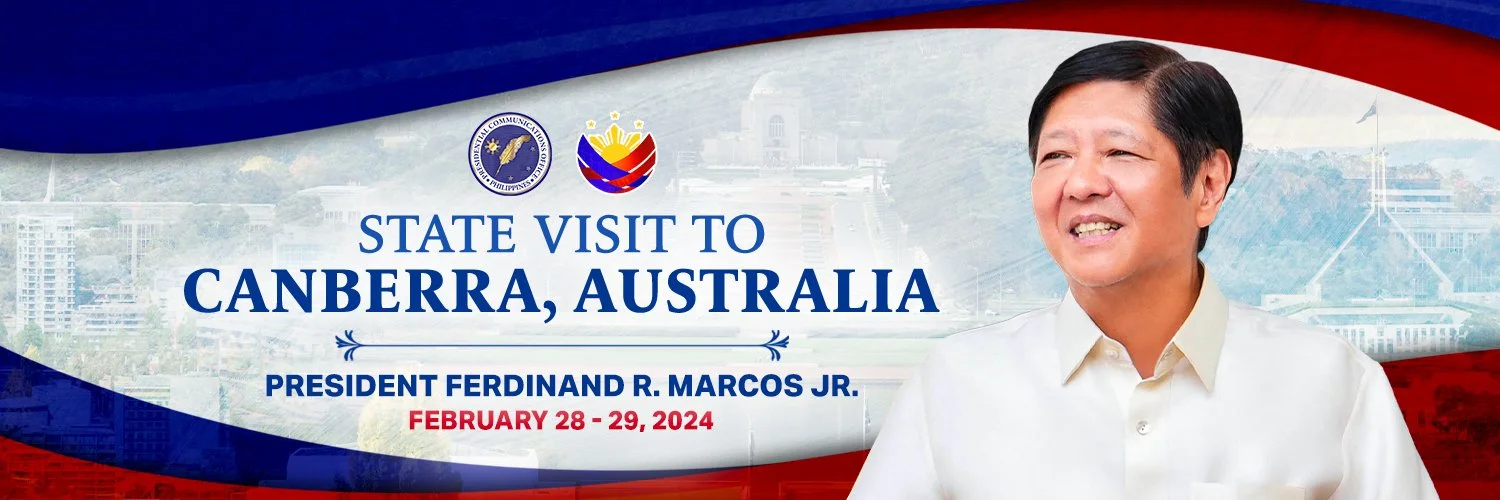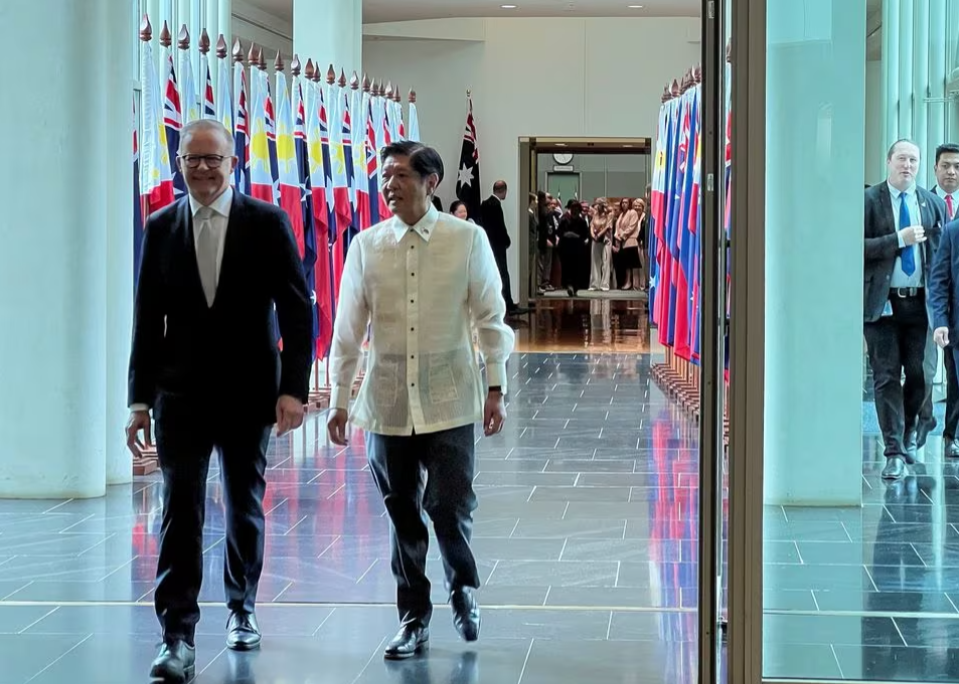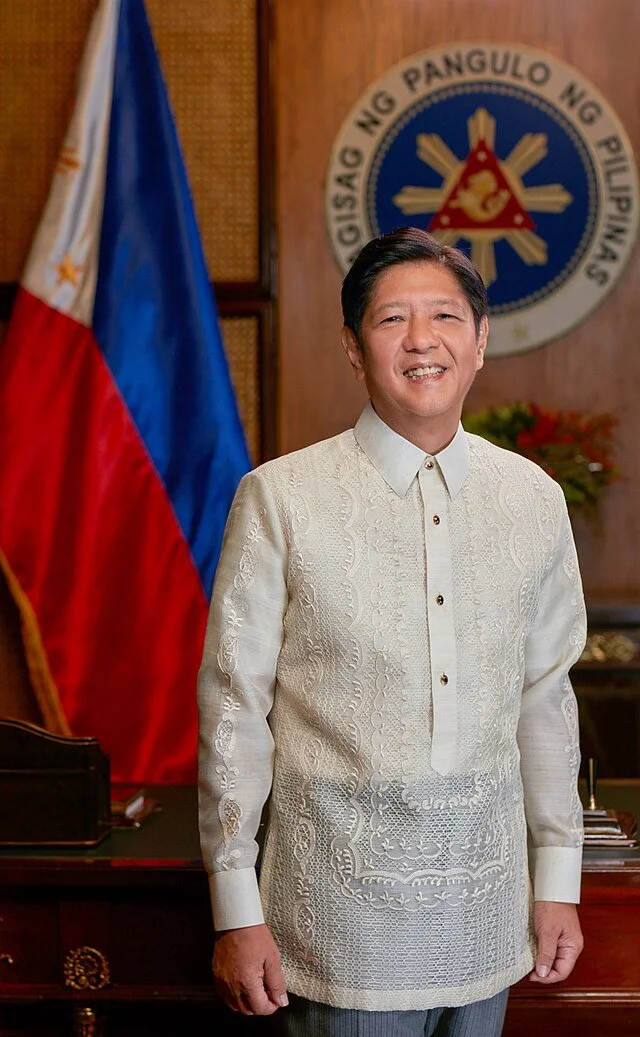A Strategic Partnership: Australia and the Philippines Unite for Regional Security
During a special joint sitting of Australia's Parliament, Philippine President Ferdinand Marcos Jr. emphasized the critical need for unity between Australia and the Philippines in the face of emerging challenges to regional peace and stability, particularly highlighting China's assertive actions. He reiterated his staunch stance against any encroachment on Philippine sovereignty, particularly in the context of China's disputed claims in the South China Sea.
Marcos emphasized the significance of their strategic partnership, emphasizing that no single country could address these challenges alone. Australian Prime Minister Albanese echoed Marcos's sentiments, highlighting the recent maritime cooperation efforts between their navies as a testament to their shared commitment to national interests and regional responsibilities.
Reminiscing about the 1974 visit of his father, former President Ferdinand Marcos, and then-Australian Prime Minister Gough Whitlam to the Philippines' WWII battlefields, Marcos Jr. reinforced the enduring bond between their nations' security interests. These statements emphasized a renewed plea for collaboration in confronting threats to “global peace”, particularly stemming from the turbulence in the South China Sea.
President Marcos's staunch statements in his address, such as "Philippines will not cede ‘one square inch’ of territory," were made against the backdrop of escalating conflicts between China and the Philippines in the South China Sea. In the same vein, a statement from the premier's office revealed that both nations signed MOUs to strengthen maritime cooperation, reinforcing their existing civil and defense maritime obligations.
This underscores the Philippines' vehement efforts to involve more regional players in the South China Sea, where it faces challenges from China's formidable naval presence. These developments were indicative that this collaboration goes beyond mere diplomatic gestures, as tangible progress is now evident. Moreover, this collaborative effort extends beyond traditional sectors, encompassing dynamic areas of cooperation.
Australia, confronted with the challenge of competing with China's deep pockets, has strategically pivoted towards directing targeted investments into the Philippines, with a particular focus on basic infrastructure development.
These initiatives have established a roadmap for numerous targeted investments. President Ferdinand R. Marcos Jr.'s successful securing of USD1.53 billion in investments from 12 business deals during the Philippine Business Forum underscores the widening breadth of this partnership.
These agreements encompass various sectors such as renewable energy, waste-to-energy technology, health technology solutions, and digital health services, demonstrating the readiness of both countries to engage and collaborate in non-traditional security sectors.
President Marcos's will leverage legislative amendments taking place in the Philippines to streamline business transactions, which will be instrumental in encouraging Australian business leaders to invest in the Philippines.
This proactive stance suggests that the Philippines will promptly explore alternative investment options to mitigate its reliance on China's investments. This notion is reinforced by recent developments, such as the Philippines opting out of Chinese funding for three railway projects and its withdrawal from China's Belt and Road Initiative (BRI). These actions indicate a shifting dynamic in the Philippines' economic partnerships and highlight the country's pursuit of diversified investment sources.
Moreover, recent MOUs signed between the two countries in defense, maritime, and cybersecurity fields highlight a significant escalation in collaboration.
This includes initiatives to enhance maritime cooperation and resilience against cyberattacks, reflecting a joint effort to address non-traditional security challenges. Furthermore, Australia's announcement of a $20 million investment to support justice system reforms in the Philippines could be interpreted as Australia's endeavor to enhance its presence and soft power in the Philippines and among its people.
The MOUs in cyber and critical technology fields, as well as cooperation in national competition commissions, signify a comprehensive approach to bilateral interaction, extending beyond domestic affairs to actively engage in multilateral initiatives such as ASEAN, showcasing Australia's multi-level engagement strategy in the region.
Additionally, the timing of the MOUs and other substantive exchanges between the two sides holds derived importance for Marcos. With midterm elections looming in the Philippines and President Marcos embroiled in a feud with the opposition, forging a strong alliance with Western allies and ASEAN countries will give a backbone to his stance against China back at home. This is a strategic initiative, which sets him apart from his predecessor.
The strategic significance of this meeting cannot be overstated, particularly given Australia's hosting of the ASEAN-Australia Special Summit in 2024. The resolute statements regarding China's interference in the South China Sea (SCS) from both Australia and the Philippines can be interpreted as an effort to set the tone for the summit, advocating strongly for an open and free South China Sea.
The recent convergence between nations such as Australia and the Philippines, marked by their resolute statements regarding the South China Sea, may serve as a significant catalyst for ASEAN unity. Historically, ASEAN has offered mere symbolic diplomatic support to the Philippines in potential confrontations with China.
However, the burgeoning bilateral ties and firm rhetoric from these nations could potentially bolster ASEAN's negotiating leverage against China.
By engaging in bilateral cooperation across various sectors and leveraging these partnerships in multilateral forums, ASEAN members can enhance their collective strength and effectiveness. Australia's substantial financial commitment, announced by Foreign Minister Penny Wong during the ASEAN summit in Melbourne, underscores the region's shared interest in maritime security.
Wong emphasized the critical role of oceans and seas for regional livelihoods and commerce, particularly emphasizing the importance of maintaining open sea lanes, notably in the South China Sea. This initiative reflects Australia's attempt to establish itself as a regional partner with ASEAN.
Moreover, the collaboration between the Philippines and Australia is more than just rhetoric and holds immense significance, particularly in light of Australia's Southeast Asia Economic Strategy to 2040, which designates the Philippines as a primary country for enhanced trade. The Philippines holds significant importance for Australia in the context of clean energy initiatives, particularly in the development and utilization of clean hydrogen and derivative fuels.
As Southeast Asia, including the Philippines, explores the potential of hydrogen in various sectors, such as electricity and industry, Australian technical assistance plays a crucial role in building expertise in this emerging field.
This collaboration not only lays the groundwork for future commercial opportunities, including clean hydrogen exports and two-way investments, but also fosters partnerships to accelerate cooperation in the clean energy transition. Moreover, with both countries emerging as regional players in battery storage, there are opportunities for Australian companies to contribute to the value chain and supply high-value battery materials to markets in the Philippines and beyond.
Additionally, exploring potential infrastructure cooperation through initiatives like the Brunei-Indonesia-Malaysia-Philippines East ASEAN Growth Area (BIMP-EAGA) underscores the importance of bilateral collaboration in driving sustainable development and economic growth in the region.
Overall, the partnership between Australia and the Philippines in clean energy and infrastructure development not only enhances energy security but also promotes economic prosperity and environmental sustainability in both countries and the wider Southeast Asian region.
Meanwhile, China's media reacted vehemently to Marcos' statements, dismissing them as naive and strategically immature.
The Communist Party-controlled Global Times newspaper went further, condemning Marcos for portraying China as a bully to garner international sympathy. The editorial warned that Marcos was isolating the Philippines by misrepresenting the situation. It criticized Marcos for playing the victim card and attempting to align the Philippines with the US, despite the reluctance of other ASEAN nations to engage in conflict.




